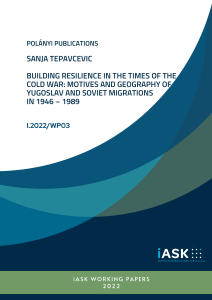Research & Studies
 About the Author
About the Author
Sanja Tepavcevic is an Associate Research Fellow at Institute of Advanced Studies Kőszeg and teaches in the International Studies MA Program at the University of Pannonia. Previously she held various academic and administrative positions at Central European University, Budapest, and faculty positions at Budapest Business University and Eotvos Loránd University. Sanja is a member of the Budapest-based non-governmental organization Dialogue and external associate of the Croatia-based Institute of European and Globalization Studies. She holds a Russian Diploma in Journalism from Moscow State University, an MA in International Relations and European Studies, and a PhD in Political Science from the Central European University. Her research expertise includes Russian foreign policy and foreign direct investments of Russian companies, post-Soviet migrations and immigrant entrepreneurship, and migration and foreign economic policies of former Yugoslav states and countries of the Visegrad 4 Group. Her publications appear in peer-reviewed journals including, United Nations’ Transnational Corporations Journal, Journal of East-West Business, and the Journal of Eastern European Management Studies. She has a decade-long experience as a journalist in Russia and Serbia. She is also a contributor for Geopolitika, a Croatian analytical portal.
Abstract
Based on the synthesis of the review of scholarly literature, interviews, and autoethnography, this paper compares (e)migration from former Yugoslavia and former Soviet Union during the Cold War, exploring the motives, forms, and geography of migrations, and types of Yugoslav and Soviet migrant communities. Major contributions of the chapter are twofold: first, it reveals migration flows and their forms between former socialist countries and between them and third world countries that were overlooked by the mainstream migration literature. Second, based on the analysis of migrant communities, the concept of mid-nations is developed in the chapter.
Key words: motives and geography of (e)migration, Yugoslavia, Soviet Union, Cold War, migrant communities, mid-nations
I.2022/WP03Download